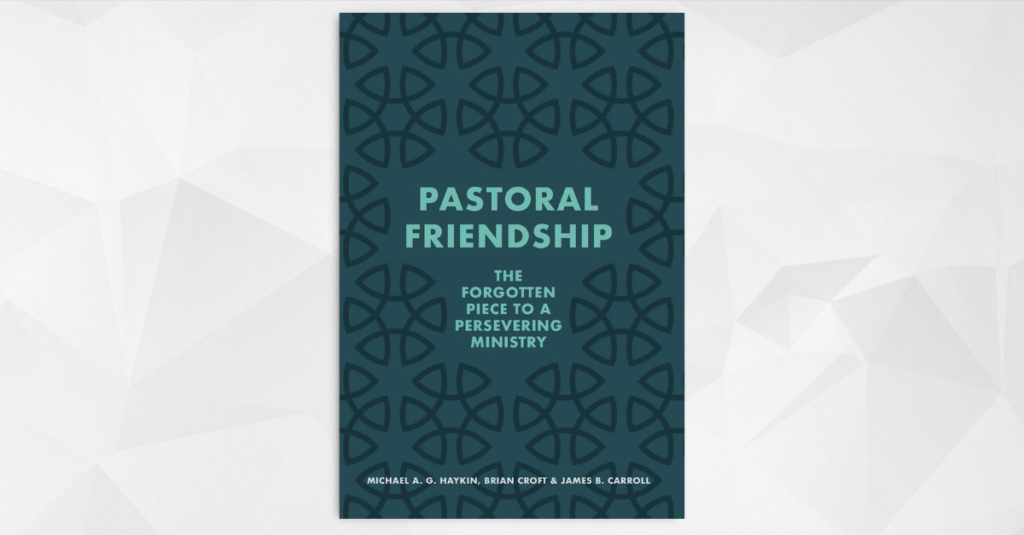Book Review: Pastoral Friendship, by Michael A. G. Haykin, Brian Croft & James B. Carroll
January 30, 2023

January 30, 2023
Michael A. G. Haykin, Brian Croft, and James B. Carroll. Pastoral Friendship: The Forgotten Piece to a Persevering Ministry. Christian Focus, 2022. 160 pages.
Our individualistic culture is beginning to wake up to the necessary, neglected gift of friendship. Pastors are not immune to the effects of our modern loneliness epidemic. The absence of true friendship contributes to the increasing rate of pastors who fizzle out, fall out through sin, or struggle through without joy.
In light of this, we welcome the book Pastoral Friendship for directly addressing this issue.
Pastoral Friendship is written by three authors—Michael Haykin, Brian Croft, and James Carroll—to encourage pastors to pursue friendship together. They argue that pastors don’t just need any friendship, but “pastor-to-pastor friendship” and that “pastoral friendship is the forgotten piece to a persevering ministry” (15). This kind of friendship helps pastors care for their souls so they might be faithful and fruitful in long-term ministry (19). In their words, “Every modern pastor needs the presence and friendship of other pastors to thrive and persevere through the unique challenges of pastoral ministry” (17).
They unfold their argument in a well-rounded manner. They first look back to examples of friendship in Scripture, drawing attention to Adam and Eve, Moses and Aaron, David and Jonathan, and Paul and Barnabas. Chapters 2 and 3 focus on two friendships among pastors from church history—one well-known (Basil and Eusebius) and one unknown (Benjamin Francis and Joshua Thomas). Following this, they make a biblical case for the necessity of friendship (Chapter 4), and then unfold how friendship’s blessings like wisdom, support, and sanctification are particularly important for pastors (Chapter 5). Chapter 6 addresses factors that keep people from pursuing friendship, and they especially highlight challenges for pastors. The final chapter is a series of exhortations and suggestions for pursuing pastoral friendship.
These authors should be commended for addressing this topic directly. It’s an urgent, yet neglected need, and there’s no book that focuses as directly on the topic. It’s also fitting that it’s a multiauthor work and is itself the fruit of friendship.
The book is by far at its strongest in the final chapters when the focus turned practical. The sixth chapter on the challenges of friendship is particularly thorough, searching, and at times startlingly direct. They frankly note that many pastors don’t pursue friendship because their prideful self-deception leads them to think they don’t need it (120). They call out how some pastors lack self-awareness and are blind to how their relational awkwardness, sense of entitlement, and inconsiderate speech keeps people from wanting to be too close to them (127, 131). Their point is clear and clearly needed: “Many people, including pastors, do not have any friends because they are terrible friends themselves” (130).
The final chapter turns even more practical with a series of helpful exhortations and suggestions for pursuing friendship. If there is one area where this book would have benefitted from further expansion, this is it. Many pastors will be freshly challenged to pursue friendship, and more practical suggestions and examples would help. Nevertheless, the suggestions here are a great start.
While those latter chapters are the strongest, the earlier chapters could use a little bolstering. The authors’ goal was correct—to give biblical and historical examples as an “inspiration and guide to teach us how modern pastors can pursue the same thing” (17). But a couple of the examples felt a bit underwhelming. Basil respected Eusebius as a distant spiritual mentor, and they corresponded from time to time. Benjamin Francis and Joshua Thomas wrote each other every few months to discuss theological and ministry questions. No doubt, It’s helpful for pastors to encourage one another through correspondence, but my guess is that most pastors have old friends with whom they correspond. What’s needed are the friends who engage us in our everyday lives. It’s the people we see week to week who get a better read on how we’re actually living, and before whom it’s especially difficult to lower our defenses. Yet those are the kinds of friendships we pastors need more of.
Additionally, while they acknowledged we are Jesus’ friends, as Jesus himself affirms (John 15:14–15), they focus on showing how our relationship with Jesus is unlike a mutual friendship (83–86). They put so much stress on how it is a “one-sided relationship” that it’s unclear why Jesus used the word “friend” at all. I agree with the importance of recognizing the ways that Jesus’s friendship is unique, but I’m also convinced that Jesus used that word for a reason, and that he invites us to view ourselves in friendship with him. This is indeed a neglected, dignifying, and powerful source of strength for pastoral ministry.
Our world needs pastors who throw themselves into the joys of what it means to be truly human, and enjoying true friendship is at the heart of this. Pastors certainly need to be united in friendship with more than just other pastors. Yet “pastor-to-pastor friendship” is a gift to pursue and enjoy for the sake of our souls, our churches, and a sustained and flourishing ministry. If you aren’t close friends with any other pastors—or if you sense you might need a fresh encouragement or challenge to be a better friend—this book is a helpful resource.